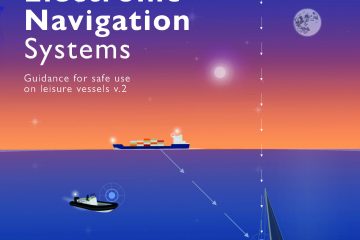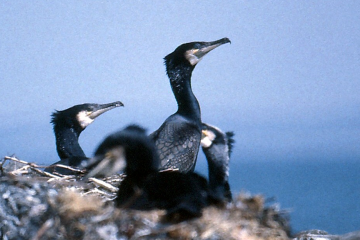By Captain John, www.skippertips.com
The standard procedure for making a Mayday call is great when you have time, but in a real-world emergency, you may have only seconds before you lose power. Flooding or fire can short out power to the radio and GPS. So, what matters most in a MAYDAY call?
Yacht on fire in rough seas – (AI generated image)
Pretty simple, really. No rescuer or other recreational or commercial vessel can get moving until they know where you are. Save the formalities, such as vessel description, call sign, number of persons aboard, etc., for later. Right now, rescuers need to know your location.
If you do not have time to give all of the information described above right now, and you have a life-threatening emergency at sea, switch your radio to Channel 16, and send an abbreviated MAYDAY message like this:
- “MAYDAY, MAYDAY, MAYDAY” – Spoken three times.
- “THIS IS:” Your vessel’s name.
- “IN POSITION:” Your position in latitude or longitude*
*If you do not have these coordinates, give your position relative to a navigation marker (buoy or beacon) or the approximate bearing to a nearby point of land.
Let’s look at an example:
- MAYDAY, MAYDAY, MAYDAY…
- THIS IS: Sailing vessel Island Lady…
- IN POSITION: 26 degrees, 13 minutes North; 68 degrees, 52 minutes West.
Now, pause for a moment and imagine that we hear this call come across our VHF marine radio. And then, silence. Nothing. Nada. Complete stillness. We turn up the radio, set the gain, but all we hear is static. If you were within a few miles of this position, could you beat feet with just this amount of information to head toward the distressed vessel Island Lady?
Maybe she is taking on water, and the water level rose to that of her batteries, and now she is adrift with no power. Or, perhaps she experienced an electrical fire, burning up the power panel, and thus the radio is dead. But, as you can see, you have everything you need to do one of two things:
- If you are close enough to their position, change course and increase speed to assist the distressed vessel. Once you arrive on scene, determine whether you can assist directly or indirectly (i.e., stand by the vessel and relay information to the responding rescue team).
- If you are further away or unable to respond, communicate with the distressed vessel and tell them you will relay their info to rescuers. If you are unable to contact the distressed vessel, contact the Coast Guard or another rescue agency and relay the information.
Once sailing vessel Island Lady has been answered by a rescue agency, a recreational, or a commercial vessel, they can provide all the other info, such as details on the nature of the distress, what assistance they are requesting, a description of the vessel, the number of people aboard, and more.
That is, if they have time. Real-world emergencies are dynamic, and things happen faster than you can imagine. Just another reason to get the most vital info out to the world so rescuers can get moving toward you.
Remember These Three Vital Points for the possibility you might one day be in distress:
- Pause for at least ten to twenty seconds after sending a MAYDAY broadcast to allow the Coast Guard or another vessel to respond.
- Lift your thumb off the transmit button on your radio after broadcasting. If you keep the button depressed, no one can respond. In a high-stress situation such as a life-threatening emergency, you can get a ‘death grip’ on a radio microphone, so press to talk; lift to listen.
- Remain calm and focused. You only have three pieces of vital info to get out. Keep radio talk simple to help rescuers provide the lifesaving assistance you need.
Captain John’s Boating Safety Tip:
Remember this golden rule in offering assistance to another vessel, whether in an emergent or non-emergent situation. Never place your own boat or crew in danger. You might stand off and act as a liaison with rescuers or float down equipment, but in any case, you do not want to end up in harm’s way, too.
Click here to boost your skipper skills: https://www.skippertips.com/public/1052.cfm
A thank you for this helpful information to:
Captain John
www.skippertips.com
captainjohn@skippertips.com



